Iran Using Civilian Ships As 'Floating Terror Bases' - Israel

Israel accused Iran's Revolutionary Guard (IRGC) on Monday of turning commercial ships into platforms for launching missiles, drones and commandos.

Israel accused Iran's Revolutionary Guard (IRGC) on Monday of turning commercial ships into platforms for launching missiles, drones and commandos.
Defense Minister Yoav Gallant added the objective was to spread Tehran's clandestine naval clout well beyond the Persian Gulf.
The allegation came as tensions between the regional foes surge afresh over Iran's nuclear drive of uranium enrichment and support for Palestinian and Lebanese militias.
Showing images of six purportedly repurposed Iranian vessels, five of them named, Gallant told the Herzliya Conference security forum that these were "floating terror bases" and that one had recently sailed toward the Gulf of Aden.
"This follows directly on the maritime terrorism Iran has been imposing on the Persian Gulf and Arabian Sea. It is working to expand its activity to the Indian Ocean, too, and later to the Red Sea and to the Mediterranean Sea as well," Gallant said.
Iran has seized dozens of commercial vessels since 2019 in around the Persian Gulf waters, often with the aim of gaining leverage against other countries, such as South Korea and Greece.
Gallant said, “The [Iranian plan] is a concerning, 'pirate policy'. Iran is conducting itself like a collection of criminal organizations and not a modern state. The floating terror bases are an extension of Iran’s ongoing maritime terrorism, as seen in its actions in the Persian Gulf and Arabian Sea."
"Iran aims to expand its reach to the Indian Ocean, the Red Sea and even the shores of the Mediterranean. This is a structured plan designed to threaten trade and flight routes – both military and civilian – and to create a permanent threat in the maritime arena,” he added.
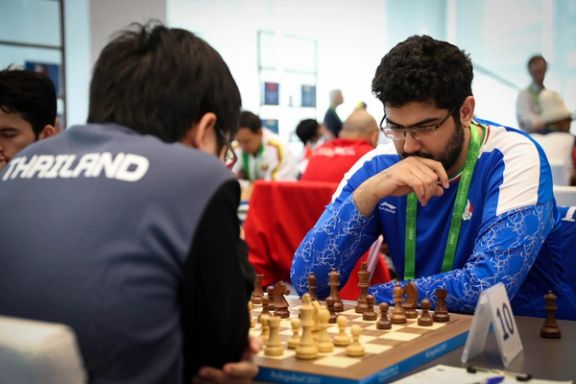
Pouya Idani, Iran's chess grandmaster, emigrated to France due to some "problems" including "difficulty in accessing the main chess websites," because of Iran's Internet restrictions.
Iran’s local media announced on Monday that the chess player “does not intend to change his citizenship and has only gone to France to live there.”
Iran Varzeshi daily claimed that Idani is going to play for the Iranian national team in the upcoming Asian Games.
"The playing conditions are more suitable for me in France and I am closer to the tournaments and leagues there," the daily quoted Idani as saying.
"I had problems in Iran, and it was difficult for me to continue competing. It was difficult for us to access some main chess sites. Even other players such as Mohammad Amin Tabatabai and Parham Maqsoudlou face the same conditions. I hope this situation will improve."
As nationwide anti-regime protests began in September, the government started to disrupt access to the internet to prevent news about the unrest being disseminated both inside the country and abroad.
Idani was awarded the title of Grandmaster by FIDE in 2014. He won the World U18 chess Championship in 2013. He is the second-best chess player in Iran as of June 2021.
Over 30 Iranian athletes have defected in recent years, seeking asylum in other countries.
In addition to dress code restrictions, another issue forcing Iranian athletes to defect is Tehran’s policy of not allowing them to compete against Israelis.
Many Iranian athletes have also displayed solidarity with the 2022 protest movement at international games despite threats of punishment.
Authorities have made serious threats against athletes and other celebrities to stop them from public displays of solidarity with protesters with little effect.
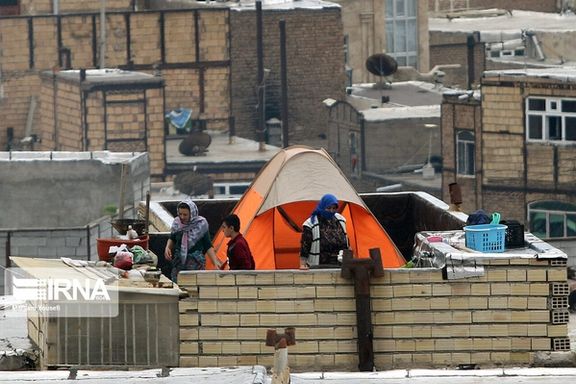
A prominent economist in Iran says high rents in Tehran push many tenants to the less expensive margins of the capital where a new social sub-class is taking shape.
In an interview with Didban Iran website, Hossein Raghfar, said as the number of those living in the margins of Iran's major cities is on the rise, there is an increased possibility of new protest movements that will take the officials by surprise.
Raghfar said, "this might happen any moment. The people are badly vulnerable and price rises have brought them to the verge of a revolt. In the meantime, officials appear to be oblivious to the looming threat."
The economist warned: "Unpredictable unrest is likely to take place. What you saw in last year's protests was only the tip of the iceberg."
The website quoted the Central Bank of Iran as reporting that rents in the Iranian capital rose by 46 percent during the first half of last year. This comes while the government had allowed landlords to increase the rents by just 25 percent. As a result, wrote the website, many have decided to live outside Tehran, and some have chosen to live in makeshift houses built on some of Tehran's rooftops.
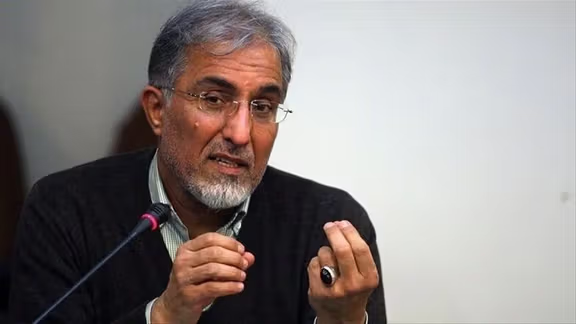
Iran has been gripped by very high inflation since 2018 when the United States withdrew from the JCPOA nuclear deal and imposed tough economic sanctions. A recent report indicated that the inflation rate is close to 70 percent.
The website wrote that more than 24 million Iranians are feeling the crunch this year as rents are going to go up once again with the beginning of the summer. Raghfar said skyrocketing rents is one of the results of rising house prices that have also led to rising prices for other goods and services. For instance, nearly 50 percent of the price of clothing people buy is used to cover the clothing shops' rents. He added that the rising cost of housing has even led some young Iranians to leave the country for good.
He also mentioned the social problems that occur as a result of rising housing cost: "Some sleep in the buses and some families share a house with another family." This, he said, marks the failure of government policies during the past three decades.
The Secretary of Trade Union of Real Estate Agents Saeed Lotfi told reporters that in parts of the Iranian capital, rents are paid in US dollars rather than the extremely devalued national currency rial. He also confirmed that some of the tenants are being pushed out of the capital and that some others share a house with another family although he said the union is against the idea of house sharing.
"Until a few years ago, there were lots of houses available for rent in southwest Tehran, but nowadays it is really difficult to find a vacant house for families who need it as many of those who were not able to afford high rents in the affluent parts of Tehran have moved to the southwest suburbs," Lotfi said.
He added that many others have chosen to move to much smaller homes as prices and rents rise. Lotfi pointed out that current prices will certainly rise further as “we have not yet reached the peak of housing market which is around September when schools re-open” for the new academic year.
Earlier reports in mid-2022 indicated that there was a more than 300 percent rise in rents in Tehran in a matter of three years. And figures released in December 2021, some six months after Ebrahim Raisi took office as President indicated that food and housing expenses in Iran had risen between 300 to 740 percent during the preceding six years while wages went up by around only 270 percent during the same period.
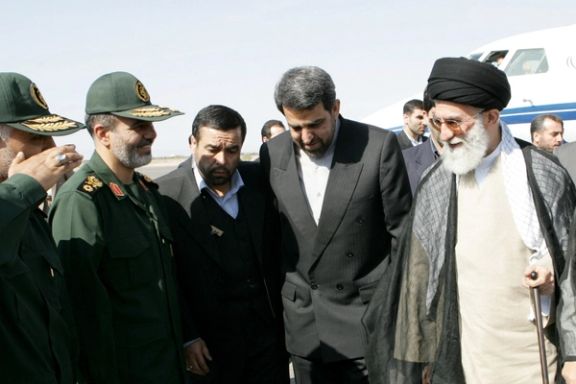
Iran's Security Chief Ali Shamkhani has stepped down with President Ebrahim Raisi appointing a heavily sanctioned Revolutionary Guards commander as his replacement.
Shamkhani, who served as the secretary of Iran’s Supreme National Security Council (SNSC) for almost a decade, was replaced by Ali Akbar Ahmadian, an IRGC chief of the Joint Staff in the 2000s who later headed the Guards’ strategic center.
In recent months there were rumors about Shamkhani stepping aside as hardliners blamed him for failure to suppress protests. In video-taped remarks released on the internet in November, former lawmaker Hamid Rasaei, a hardliner cleric, accused him of failing to quash protests.
He will be replaced by Ahmadian, a natural born IRGC commander, designated by the UN Security Council in March 2007 and listed by the European Union in April 2007. By October same year, he was added to the Specially Designated Nationals (SDN) list of the US Department of the Treasury. He is also sanctioned by the governments of Australia and Japan.
It is unclear if Shamkhani resigned or was pushed. A long-time ally of the Supreme Leader appointed as the secretary of the SNSC in September 2013, he has been instrumental in shaping the regime’s security policies during his tenure. The rear admiral upper half (two-star general) was the only ethnic Arab Iranian in such a senior position and was active across the whole political sphere in the Islamic Republic since its establishment.
Shamkhani was engaged in an armed struggle against the Pahlavi dynasty as a member of a clandestine Islamist guerrilla group, Mansouroun, and joined the IRGC shortly after the Islamic Republic’s formation in 1979. He served as deputy commander of the Guards from 1981 to 1988 and as defense minister under two-term reformist president Mohammad Khatami from 1997 to 2005.
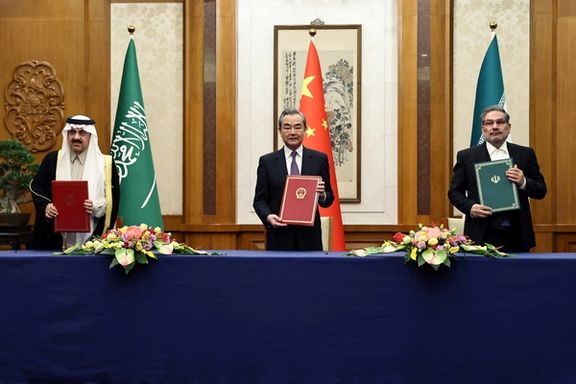
Like most regime insiders, he has been dogged by scandal, including reports about Shamkhani’s sons -- Hassan and Hossein -- owning dozens of businesses, such as large shipping companies. There have also been reports about the extravagant lifestyle of his family members in Iran and abroad. Following “rumors” that even his toddler grandson has hundreds of thousands of dollars in just one bank account as well as several properties, authorities announced that the bank account was blocked. Iran International’s investigative journalist Mojtaba Pourmohsen has published several exposés about the family corruption, including his nephews Mo’ud and Naji Shamkhani.
His final legacy was the China-brokered détente with Saudi Arabia. Saudi Arabia had severed relations with the Islamic Republic in January 2016 after pro-government Iranian mobs attacked and ransacked its embassy in Tehran and consulate in Mashhad following the execution of a Saudi Shiite cleric.
After Shamkhani signed the agreement to end a years-long political rift with Saudi Arabia in Beijing on March 10, he embarked on regional trips to improve strained relations with Arab neighbors. Visits to the UAE and then Iraq were part of the effort to keep up the momentum.
Journalist Ehsan Mehrabi told Iran International that the sidelining of Shamkhani is that Khamenei wanted someone with a less scandalous career for the job. He added that although Ahmadian -- the new security chief – played a key role in the Islamic Republic’s naval mining of the southern waters of Iran, he mostly kept a low political profile, hardly appearing in the media or delivering speeches.
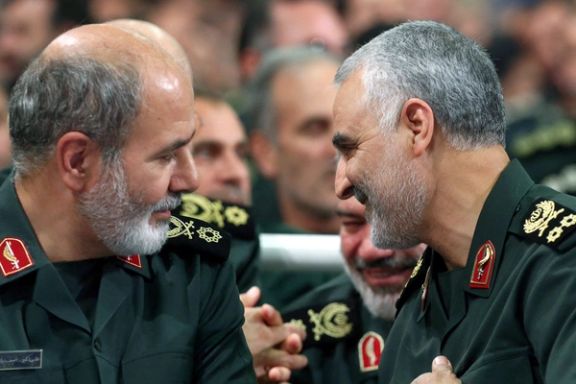
The pundit also believes that Khamenei and Raisi may also seek to prevent Shamkhani winning any further credit for Tehran’s upcoming diplomatic gains after the restoration of ties with Riyadh, perhaps with Egypt on the agenda.
Speaking to Iran International, political commentator Morteza Kazemian suggested the new security chief will likely expand focus on the regime’s security policy to Iran’s regional proxy forces, holding views similar to those of Qassem Soleimani, the former commander of the IRGC’s extraterritorial Quds Forces killed by the US in Baghdad in 2020. The long-time IRGC loyalist even served as the head of the Imam Hossein University, where Iran recruits and trains Revolutionary Guards.
He is also of the opinion that Raisi assigned Ahmadian for the job under the orders of Khamenei, who recently also appointed the IRGC commander as a member of the country’s Expediency Discernment Council, an administrative assembly whose members are appointed by the Supreme Leader.
Speculation continues over whether or not the personnel change will lead to real policy shifts, some even suggesting Shamkhani might be considered for a "more important position" in Iran, especially considering a parliamentary election on the horizon. Whatever the reasons, Shamkhani’s departure may indicate the regime is heading toward an ever-more conservative direction, reshuffling anyone even deemed moderately centrist.
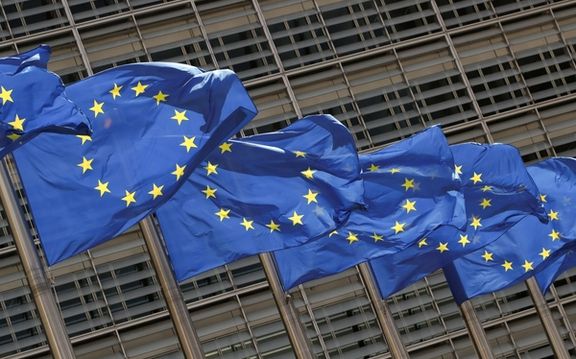
The European Union on Monday imposed new sanctions on Iranian officials and entities for their role in the violent crackdown on popular protests.
The new package of sanctions targets five Iranians and two entities responsible for serious human rights violations in Iran, according to the European Council.
The Council listed the Revolutionary Guards’ Cooperative Foundation, which is the body responsible for managing the IRGC’s investments and funneling money into the regime’s repression machine.
The other IRGC entity that was blacklisted was its Student Basij Organization (SBO), which acts as the IRGC’s arm in enforcing hijab and cracking down protests on university campuses. “The SBO consists of the youngest and most radical members of the Basij," the EU said, adding that during raids on a number of university campuses -- including at Sharif University, Shahid Beheshti University and Amirkabir University -- security forces, including the SBO members, used live ammunition and opened fire on students.
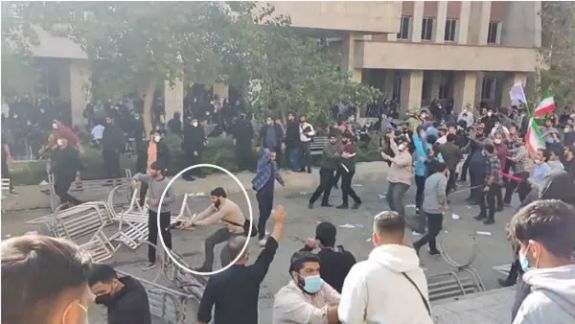
Furthermore, the current commander of the Tehran Police Relief Unit of Iran’s Law Enforcement Forces (LEF), Salman Adinehvand, was added to the EU list because his unit “was directly responsible for the violent suppression of protests in Tehran in September and October 2022, during which dozens of protestors were killed by security forces using live ammunition.”
The secretary of Iran’s Supreme Council of Cyberspace (SCC), Mohammad-Amin Aghamiri, was blacklisted over the blockage of popular online news and communications platforms. The SCC, the centralized authority for policymaking in cyberspace, has also used digital technology to spy on and harass journalists and regime dissidents, the EU statement said.
Mohsen Nikvarz, the public prosecutor of Sirjan in Kerman Province, was sanctioned over the “Maryam Arvin case” -- a lawyer who was brutally arrested, gravely mistreated, and subsequently died for her activities in defense of protesters. He was also responsible for several arbitrary arrests of lawyers and death sentences in Sirjan during the 2019 protests.
Deputy Supervisor of Public Spaces of the Public Security Police Colonel Nader Moradi was put on the list for persecution and arrest of shop owners who closed their businesses and were planning on striking in protest of the death of Mahsa Amini.
The other sanctioned official was Iranian police spokesman Saeed Montazerolmahdi, who repeatedly downplayed nationwide schoolgirl poisonings by claiming the "majority" of those alleged were "not real". “His intimidating statements on monitoring, the closure of businesses and other public spaces, and the warning texts that are being sent by the authorities have a very significant repressive impact,” added the statement.
EU’s restrictive measures now apply to a total of 216 individuals and 37 entities. They consist of an asset freeze, a travel ban to the EU and a prohibition to make funds or economic resources available to those listed.
The G7 countries had already issued a tough statement in their summit in Japan on Saturday, calling on all countries to consider UN resolutions against Iranian arms transfers.
“We express our grave concern regarding Iran’s continued destabilizing activities, including the transfer of missiles, unmanned aerial vehicles (UAVs) and related technologies to state and non-state actors and proxy groups, in breach of UNSCRs including 2231 and 2216.”
The Iranian foreign ministry appeared jittery about the G7 statement. Its spokesman on Monday unleashed a barrage of criticism and accusations against “some members” of the group that he called “colonial” powers “who for decades have projected their policies of dominance over the world and especially in our region.”
Spokesman Nasser Kanaani flatly denied that Tehran has transferred armed drones to Moscow, despite overwhelming and clear material evidence. Russia has so far used hundreds of Iranian-made Shahed killer drones against Ukraine’s civilian targets.
G7 countries also expressed deep concern over Iran’s nuclear program that gallops forward with high levels of uranium enrichment.
“We reiterate our clear determination that Iran must never develop a nuclear weapon. We remain deeply concerned about Iran’s unabated escalation of its nuclear program, which has no credible civilian justification and brings it dangerously close to actual weapon-related activities,” the final communiqué said.
The G7 also accused the Islamic Republic of gross human rights violations, after unrelenting executions of dissidents and the killing of more than 500 people during protests in 2022 and jailing more than 20,000 people.
Iran’s unabated uranium enrichment, regional interventions that fuelled recent Israeli Palestinian fighting, and its provision of weapons for Russia can all add up and lead to an effort by the West to revive international sanctions against Tehran.
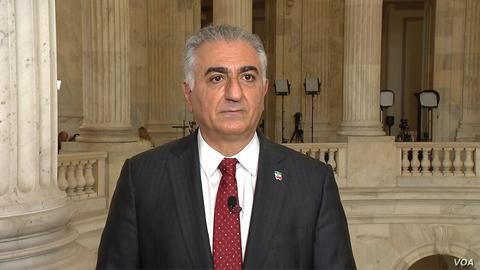
Iran’s exiled prince has blamed state "terrorism" for the killing of five border guards in the southeastern province of Sistan and Baluchestan on Saturday.
In a post on Twitter, Reza Pahlavi said: “I express my sincere sympathy with and condolences to the families of these murdered soldiers and strongly condemn this act of terrorism,” he added.
The border guards spotted a group of armed men near the border in Saravan, in the southeastern province of Sistan and Baluchestan. The five officers were killed in the ensuing confrontation with the “terrorist group” on Saturday night.
Two other guards were left seriously injured and are in a critical condition, it was also reported.
There is no information about the affiliation of the armed group, but several Baluch groups from the area are fighting an insurgency against the Islamic Republic.
The most prominent is Jaish al-Adl, which has often targeted Iran's military, especially the Islamic Revolutionary Guard Corps (IRGC).
In recent months, the situation in Sistan-Baluchistan has dramatically worsened. The area’s cities have become very tense, especially on Fridays, when residents come out to protest against the regime.